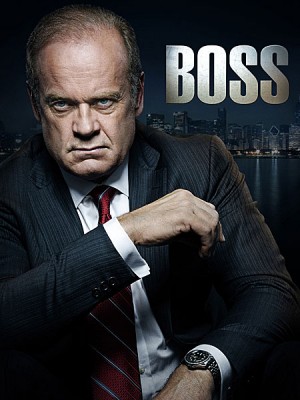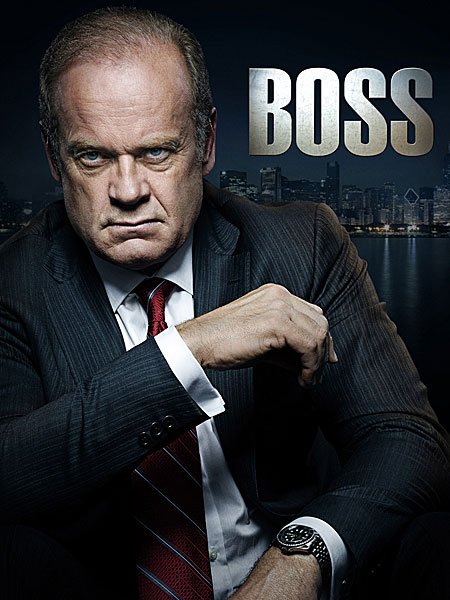Frasier Crane is one of the most iconic TV characters of all time. Between Cheers and Frasier, Kelsey Grammer played everyone’s favorite bumbling psychiatrist for 20 years. That’s enough to tie Gunsmoke‘s Marshall Matt Dillon (played by James Arness) for the longest-running primetime character in TV history. Many actors have a hard time distancing themselves from characters they only played for a couple of years—how the hell is Kelsey Grammer supposed to make us all forget about Frasier Crane?
Well, on the new series Boss from Starz, you won’t be missing Frasier Crane one bit.
From the first frame of Boss’s pilot episode, Grammer asserts himself as a bonafide dramatic presence. Kelsey Grammer is a classically-trained actor (even on Cheers he played the hell out of Frasier’s dramatic arcs), but it’s easy to underestimate Grammer’s abilities when he’s been headlining network sitcoms for 20 years. His performance here is mesmerizing, definitely enough to make me want to continue to watch, despite some of the show’s flaws.

Boss follows the powerful mayor of Chicago, Tom Kane (Grammer), as he rules with an iron fist among the city’s political elite. Kane is a gifted orator and a Machiavellian politician. He is not above exploiting a corrupt system to get what he wants and to keep his power. He is able to essentially hand-pick the state’s gubernatorial victor while still handing out harsh punishments to his underlings. Kane is an expert at what he does, and he really seems to love it dearly. Oh, and one more thing—he’s going to die in about 4 years.
The first scene of the pilot episode begins with a long closeup of Kane as he receives the news that he has Lewy Body, a rare degenerative disorder similar to Parkinson’s or Huntington’s disease. In all honesty, this plot point seems like boilerplate cable drama. There is enough drama to glean from Kane trying to keep himself in power in a corrupt (and fictionalized) Chicago government; I’m not sure that adding terminal illness is necessary to the story; it seems more like another element to get Kelsey Grammer a bunch of awards. This sort of vocational irony narrative has pervaded TV for years now (Dr. House can fix anybody….except himself! Tom Kane controls all of Chicago….but soon he won’t be able to control his own body!), and at this point it seems like requisite cable drama rather than an essential plot point.
Several critics and hundreds of online commenters have already began drawing comparisons to The Wire. While it’s true that both series are set in a quasi-realistic political setting, Boss seems to be going for a more soapy tone, focusing on the character of Tom Kane rather than weaving together several stories to paint a picture of a whole city. Boss is conscious of Chicago, and there a few nice scenes where they remark on its history, but not in the same way The Wire was with Baltimore.
Boss is more interested in entertainment value than the gritty realism of The Wire—and I’m completely fine with that. Gus Van Sant’s direction in the pilot is a bit on the nose at times, but his in-your-face camera work shows that the show wants to get into the minds of its characters rather than make a political statement.
It will be interesting to see how this season of Boss plays out, since Starz renewed it for a second season before the first episode even aired. Kelsey Grammer really shines here, showing no echoes of his sitcom stardom. If for no other reason, Boss is worth watching just to see Grammer work.
Boss airs Fridays at 10pm on Starz.


I think Tom Kane’s terminal illness provides an interesting backdrop. Will he be more ruthless, uncaring about the future of the city or state because it isn’t his future? Or will it soften him somehow, as he contemplates the end. Only the audience (so far) can evaluate his decisions in this light.